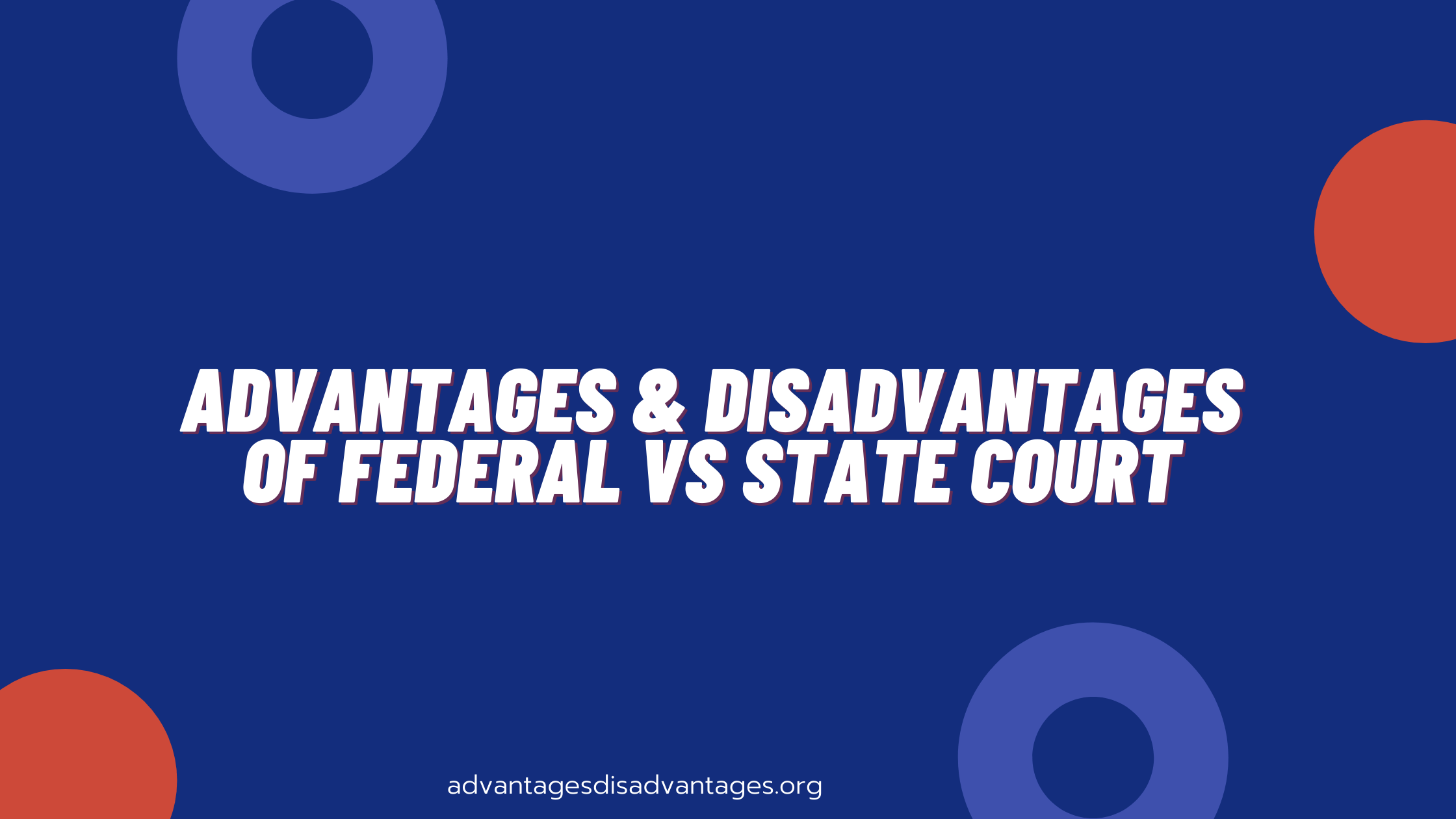Law
Advantages and Disadvantages of Federal vs State Court

The court system has two large bodies Federal and state courts. Jurisdiction is the legal definition that determines which court can hear a case.
In certain cases, both the state and the federal courts may have authority over the matter. For example, cases involving parties in two separate States refers to as diversity jurisdictions, may qualify to be brought before either federal or state courts. If both options are open, the plaintiff can choose how to file the complaint.
Table of Contents
Advantages and Disadvantages of Federal vs State Court
Advantage of federal versus state court:
Here are some advantages of federal versus state courts for file cases in these courts.
-
Caseload:
State courts deal with a much greater amount of instances and have more interaction with the public than federal courts do. While the federal courts hear much fewer cases than the state courts, the cases they hear appear more frequently to be of national significance. So we would say that the federal court takes less time to give a decision.
-
Timeline of case verdict:
The process of cases solution is more systematic, usually quicker than the state court.
-
The expense of federal versus state court:
The electronic filling in some federal courts saves cost.
-
Nature of jurisdiction:
The state courts are governed by the laws of every other State and have wide jurisdiction. Federal courts, on the other hand, are organized by the Constitution and have a much-limited jurisdiction.
-
Less Delay in cases:
Federal courts appear to be the less forgiving of disruptions on either side, and persistence is not what the plaintiffs seek.
-
Transparent Decision:
It is no wonder that businesses suing as claimants usually tend to appeal to the federal court, not the state court. Federal courts are assumed to be more stable, more open, and less susceptible to local prejudice than national courts. The benefit of federal over state courts is that state courts are mostly state legislators and will make decisions based on self-preservation, and federal judges are selected for life and not affected by job stability; another benefit would be that judgments by the higher court, such as the federal court of appeal, would be conclusive.
The disadvantage of federal versus state court:
-
Expensive:
It is reported that federal court is expensive than state court. There are a lot of works to discover verdict so the client bears more expense than in state court. In the case of State courts, the discovery process usually does not take place until the parties have made their allegations. On the other hand, the exploration process starts before this decision is done.
-
Complexity:
In federal court cases become complex in some conditions. The Federal Court and its procedures prove to be more complicated than the state court. It may or may not be possible to amend the complaint to defeat diversity authority. Without an interview, an in-depth review is unlikely.
-
Fast track cases:
Some lawsuits will be resolved after the investigation is finished, others will give a comprehensive trial. Due to procedural discrepancies that result in a more in-depth nature of the legal problems, trials that are tired in the federal court usually take longer than those pursued in the state system.
-
Timeline for cases:
The period in each case would be different. State courts can monitor cases in less time but federal courts consider to better than state court in this regard. This may minimize the time required to settle a lawsuit, which may also help reduce the total cost.
-
Diversity over cases:
federal Courts have authority over personal injury cases only if there is a “diversity” between the parties. Variety is all about the state in which each community lives. Diversity of jurisdiction occurs if all plaintiffs are from separate states than all victims and the number in dispute. If a faction on the opposite side is of the same state, diversity would be lost.
Final Words:
In certain cases, both the state and the federal courts may have authority over the matter. For example, cases involving parties in two separate States, alluded to as diverse jurisdictions, may qualify to be brought before either federal or state courts. If both choices are open, the plaintiff may choose where to file the complaint. In such cases, it is prudent to provide a solid grasp of the advantages and disadvantages of federal versus state courts before the choice of jurisdiction. The disparities in costs and pace are two areas to be considered.
Read Here : Quantitative Research Advantages and Disadvantages

-

 Health5 years ago
Health5 years agoAdvantages and Disadvantages of Milk
-

 Tech4 years ago
Tech4 years ago6 Tips to Improving E-Commerce Websites
-

 Home5 years ago
Home5 years agoAdvantages and Disadvantages of Village Life in Points
-

 Travel5 years ago
Travel5 years agoAdvantages and Disadvantage of Travelling
-

 Sports3 years ago
Sports3 years agoThe benefits of playing an online live casino
-

 Tech5 years ago
Tech5 years ago10+ Advantages and Disadvantages of Mobile Phones in Points
-

 Tech5 years ago
Tech5 years agoEssay on Advantages and Disadvantages of Offline Shopping
-

 Tech5 years ago
Tech5 years ago8+ Advantages and Disadvantages of Motorcycle |Having Bike